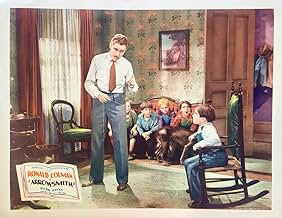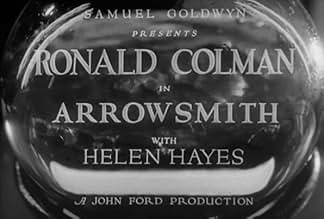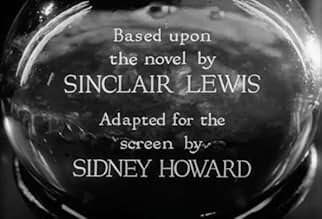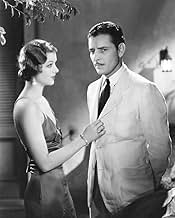AVALIAÇÃO DA IMDb
6,2/10
2,2 mil
SUA AVALIAÇÃO
Adicionar um enredo no seu idiomaA medical researcher is sent to a plague outbreak, where he has to decide priorities for the use of a vaccine.A medical researcher is sent to a plague outbreak, where he has to decide priorities for the use of a vaccine.A medical researcher is sent to a plague outbreak, where he has to decide priorities for the use of a vaccine.
- Direção
- Roteiristas
- Artistas
- Indicado a 4 Oscars
- 4 vitórias e 4 indicações no total
Alec B. Francis
- Twyford
- (as Alec Francis)
Erville Alderson
- Pioneer
- (não creditado)
Beulah Bondi
- Mrs. Tozer
- (não creditado)
Florence Britton
- Miss Twyford
- (não creditado)
Josephine Brown
- West Indies Village Bride
- (não creditado)
Nora Cecil
- Nurse
- (não creditado)
- Direção
- Roteiristas
- Elenco e equipe completos
- Produção, bilheteria e muito mais no IMDbPro
Avaliações em destaque
Goldwyn put together a lot of fine talent here, but none of it jells.
Ronald Colman, Laurence Olivier's idol and one of the screen's most likable actors, is just plain miscast. Helen Hayes projects annoyingly to the audience, stage fashion, rather than letting the camera discover her emotions, as even the young Myrna Loy knows how to do. Richard Bennett is enjoyably over-the-top as Sondelius but A. E. Anson's accent is a deal-breaker as Gottlieb (as if there weren't enough real Middle European actors in Hollywood at the time).
Sydney Howard's script is condensed to the point of silliness - the other reviewers here who contrast "Gone With the Wind" as a model of condensation are praising an uncredited Ben Hecht, not Sydney Howard. Ray June's fluid cinematography is beautiful throughout, with more than one shot that would wind up re-used in Ford's "The Searchers" many years later.
The story is that Goldwyn hired a bibulous Ford on condition that the director couldn't take one drink during production. Helen Hayes noticed that as the shoot progressed, Ford started discarding pages and then whole scenes, in a race to finish the film and get back to his booze. That may be one more reason that the film is barely coherent.
Hey, nobody's perfect all the time.
Ronald Colman, Laurence Olivier's idol and one of the screen's most likable actors, is just plain miscast. Helen Hayes projects annoyingly to the audience, stage fashion, rather than letting the camera discover her emotions, as even the young Myrna Loy knows how to do. Richard Bennett is enjoyably over-the-top as Sondelius but A. E. Anson's accent is a deal-breaker as Gottlieb (as if there weren't enough real Middle European actors in Hollywood at the time).
Sydney Howard's script is condensed to the point of silliness - the other reviewers here who contrast "Gone With the Wind" as a model of condensation are praising an uncredited Ben Hecht, not Sydney Howard. Ray June's fluid cinematography is beautiful throughout, with more than one shot that would wind up re-used in Ford's "The Searchers" many years later.
The story is that Goldwyn hired a bibulous Ford on condition that the director couldn't take one drink during production. Helen Hayes noticed that as the shoot progressed, Ford started discarding pages and then whole scenes, in a race to finish the film and get back to his booze. That may be one more reason that the film is barely coherent.
Hey, nobody's perfect all the time.
On paper, 'Arrowsmith' sounded like it had potential to be a great film. Great source material courtesy of Sinclair Lewis. A fine director in John Ford, though he was early on in his career at this point, who went on to direct some of cinema's finest westerns. That it was a box office hit in the day. And a gifted cast in Ronald Colman, Helen Hayes and pre-stardom Myrna Loy. Did have a couple of reservations though, as the length did sound far too short for such a big and meaty book and the reviews here were very mixed.
Can totally understand the mixed critical reception here and am very mixed in 'Arrowsmith' myself. It is not a terrible film as there are good things, but there are just too many things wrong with it to consider it a good film. There are books that would either leant themselves much better to a mini-series or should have been left alone and 'Arrowsmith' is a case of both instances. In honesty though, one doesn't really to have read the book to see how heavily flawed it is. As far as Ford's films go this is a lesser effort.
'Arrowsmith' does benefit from some good things. Will agree that in some ways that Colman is miscast, but he does bring freshness and sincerity to the lead role. Hayes is noble and poignant and Loy is suitably vivacious in a rather underwritten role. The relationship between Arrowsmith and Joyce was quite bold back then and has spark. Richard Bennett is also very good in his role.
The production values are quite good too, especially the photography. Dark, vivid and atmospheric, plus Hayes and especially Loy look fantastic in their shots. The settings are handsome and evocative. The music score sweeps without being intrusive.
However, the film just feels far too rushed and choppy, which a couple of my friends who had not read the source material also felt. The heavily condensed story is very rushed in pace and with such a lot glossed over there is a sense of incompleteness which gives off a choppy feel structurally and a lack of coherence. The characters are underwritten, especially Joyce, and their motivations vague at best.
Furthermore, the script is very Cliff notes, a case of introducing one event and character and then moving onto the next without development. It is also very stilted. Ford went on to be a fine director, but here he didn't seem to know what to do with the material or seem right for it, too routine and lightweight while at other times too heavy. Do agree that although Colman does give his all, he was too old and artistocratic.
In summary, watchable but really doesn't live up to its potential. 5/10
Can totally understand the mixed critical reception here and am very mixed in 'Arrowsmith' myself. It is not a terrible film as there are good things, but there are just too many things wrong with it to consider it a good film. There are books that would either leant themselves much better to a mini-series or should have been left alone and 'Arrowsmith' is a case of both instances. In honesty though, one doesn't really to have read the book to see how heavily flawed it is. As far as Ford's films go this is a lesser effort.
'Arrowsmith' does benefit from some good things. Will agree that in some ways that Colman is miscast, but he does bring freshness and sincerity to the lead role. Hayes is noble and poignant and Loy is suitably vivacious in a rather underwritten role. The relationship between Arrowsmith and Joyce was quite bold back then and has spark. Richard Bennett is also very good in his role.
The production values are quite good too, especially the photography. Dark, vivid and atmospheric, plus Hayes and especially Loy look fantastic in their shots. The settings are handsome and evocative. The music score sweeps without being intrusive.
However, the film just feels far too rushed and choppy, which a couple of my friends who had not read the source material also felt. The heavily condensed story is very rushed in pace and with such a lot glossed over there is a sense of incompleteness which gives off a choppy feel structurally and a lack of coherence. The characters are underwritten, especially Joyce, and their motivations vague at best.
Furthermore, the script is very Cliff notes, a case of introducing one event and character and then moving onto the next without development. It is also very stilted. Ford went on to be a fine director, but here he didn't seem to know what to do with the material or seem right for it, too routine and lightweight while at other times too heavy. Do agree that although Colman does give his all, he was too old and artistocratic.
In summary, watchable but really doesn't live up to its potential. 5/10
Sinclair Lewis wrote ARROWSMITH in 1923, after the first two of his blockbuster novels that dissected American Society (MAIN STREET and BABBITT). Lewis decided to make a complete study about the medical profession. As such it was brilliant - far more brilliant than this movie is. If one can think of the novel as what it is - an expose about what is wrong concerning the medical profession - the novel is a glass of fine champagne, and this movie version is a glass of lemonade! Lewis takes us along the entire career of Martin Arrowsmith - through medical school, through practice in a small town, through his marriage to Leora Tozer, through his going to the big city (New York) where he is connected to a large, well-known Foundation, to his battling the plague (and losing his wife and his co-worker), and his finally coming to terms with what he wants from his profession. For the key to the novel is that medicine is extremely lucrative, but Martin is very idealistic. He does not seek riches, but wants to help his fellow man.
The problem, as the film proceeds, is that the people who run or control the profession (or society, for that matter) can care less for the idealistic goal. For one reason or another they want results that are pragmatic or banal. For example, one would think that the Foundation (a swipe at the Rockefeller Foundation, by the way) would be really gung ho about an idealistic medical researcher. They certainly have the laboratories and talent for real progress. But they also have a strong desire for immediate results that can be used for propaganda purposes. So they keep pushing aside certain desires for private testing that Arrowsmith and his mentor Max Gottlieb (A.E. Anson) are requesting on the bubonic plague serum. The director of the foundation insists that Arrowsmith goes to a plague saturated island with his co-discoverer, for immediate SUCCESSFUL results. This leads to massive tragedy in the novel and the film.
This doesn't come across too clearly in the film. Instead it looks like Martin (Colman) would like more time to test, but the emergency prevents it. This weakens the novel's criticism. And this is not the only example.
When Martin starts out in the small town, the local medical community has this idiot running it who knows squat about modern medicine, but is great at self-advertising. The man, who looks like Theodore Roosevelt, thinks that the height of local medical activity is running a "health day" parade. This too is not in the movie.
The film, in short, short-changes Lewis's wonderful novel. In fact, more of the spirit of Lewis's attack can be found in the Robert Donat - Rosalind Russell - Ralph Richardson film THE CITADEL (based on an A. J. Cronin expose novel). That's rough, considering how important the critique by Lewis really was.
The film's cast gives it their all, particularly Helen Hayes (still the young actress who won her first Oscar that same year for THE SIN OF MADELON CLAUDETTE), Myrna Loy (in a heavily cut role) and Colman. John Ford's directing was somewhat mediocre in this film, unlike later works of his. So I give it a "6" out of "10".
The problem, as the film proceeds, is that the people who run or control the profession (or society, for that matter) can care less for the idealistic goal. For one reason or another they want results that are pragmatic or banal. For example, one would think that the Foundation (a swipe at the Rockefeller Foundation, by the way) would be really gung ho about an idealistic medical researcher. They certainly have the laboratories and talent for real progress. But they also have a strong desire for immediate results that can be used for propaganda purposes. So they keep pushing aside certain desires for private testing that Arrowsmith and his mentor Max Gottlieb (A.E. Anson) are requesting on the bubonic plague serum. The director of the foundation insists that Arrowsmith goes to a plague saturated island with his co-discoverer, for immediate SUCCESSFUL results. This leads to massive tragedy in the novel and the film.
This doesn't come across too clearly in the film. Instead it looks like Martin (Colman) would like more time to test, but the emergency prevents it. This weakens the novel's criticism. And this is not the only example.
When Martin starts out in the small town, the local medical community has this idiot running it who knows squat about modern medicine, but is great at self-advertising. The man, who looks like Theodore Roosevelt, thinks that the height of local medical activity is running a "health day" parade. This too is not in the movie.
The film, in short, short-changes Lewis's wonderful novel. In fact, more of the spirit of Lewis's attack can be found in the Robert Donat - Rosalind Russell - Ralph Richardson film THE CITADEL (based on an A. J. Cronin expose novel). That's rough, considering how important the critique by Lewis really was.
The film's cast gives it their all, particularly Helen Hayes (still the young actress who won her first Oscar that same year for THE SIN OF MADELON CLAUDETTE), Myrna Loy (in a heavily cut role) and Colman. John Ford's directing was somewhat mediocre in this film, unlike later works of his. So I give it a "6" out of "10".
Arrowsmith (1931)
*** (out of 4)
John Ford's adaptation of Sinclair Lewis' novel about a young doctor (Ronald Coleman) who constantly fears that he's not as good as everyone says. The doctor keeps struggling with his duties to his profession as well as his duties to his wife (Helen Hayes). I wasn't expecting too much out of this film but was pleasantly surprised how much I enjoyed it even with all of its flaws. Ford's direction is fairly weak as he never really brings any flair to the material but this is made up with some terrific performances. Coleman steals the film and really delivers all the goods as he's able to show the frustrations of a doctor trying to do the right thing for everyone. Hayes is also very good in her supporting role as is the supporting cast, which includes Richard Bennett, A.E. Anson and Myrna Loy.
*** (out of 4)
John Ford's adaptation of Sinclair Lewis' novel about a young doctor (Ronald Coleman) who constantly fears that he's not as good as everyone says. The doctor keeps struggling with his duties to his profession as well as his duties to his wife (Helen Hayes). I wasn't expecting too much out of this film but was pleasantly surprised how much I enjoyed it even with all of its flaws. Ford's direction is fairly weak as he never really brings any flair to the material but this is made up with some terrific performances. Coleman steals the film and really delivers all the goods as he's able to show the frustrations of a doctor trying to do the right thing for everyone. Hayes is also very good in her supporting role as is the supporting cast, which includes Richard Bennett, A.E. Anson and Myrna Loy.
Based off the Lewis Sinclair epic, Arrowsmith follows a young doctor's journey as he explores different avenues of medicine and research. As you might expect, from page-to-screen, a little ends up on the cutting room floor. Still, if you like medical movies, you'll probably want to give this classic a try. It reminded me of a cross between The Citadel and The Doctor and the Girl.
As I've frequently said, there are two sides to Ronald Colman, and Arrowsmith contains the version with a stick perpetually lodged somewhere uncomfortable. He's not as passionate as he is in other movies, so keep that in mind. For a better first impression of him, try A Tale of Two Cities. You'll get a fine first impression of Helen Hayes, though, who plays his long-suffering wife. She's young and pretty in this one, a far cry from her Miss Marple little-old-lady persona of later decades. She has more passion than her husband, and she repeatedly pushes him to pursue his medical interest, even at the expense of their personal life. She never wants to be left behind, and she follows him all around the world as he conducts research for the bubonic plague.
You'll see Myrna Loy for about five minutes, but it's not her movie, so don't expect anything other than a pretty face. Colman and Hayes have pretty faces, too, and it is always fun to see a very old movie, but it's not my favorite. I like The Doctor and the Girl better, so if you find this movie lacking, you might want to check out Glenn Ford's take on it.
As I've frequently said, there are two sides to Ronald Colman, and Arrowsmith contains the version with a stick perpetually lodged somewhere uncomfortable. He's not as passionate as he is in other movies, so keep that in mind. For a better first impression of him, try A Tale of Two Cities. You'll get a fine first impression of Helen Hayes, though, who plays his long-suffering wife. She's young and pretty in this one, a far cry from her Miss Marple little-old-lady persona of later decades. She has more passion than her husband, and she repeatedly pushes him to pursue his medical interest, even at the expense of their personal life. She never wants to be left behind, and she follows him all around the world as he conducts research for the bubonic plague.
You'll see Myrna Loy for about five minutes, but it's not her movie, so don't expect anything other than a pretty face. Colman and Hayes have pretty faces, too, and it is always fun to see a very old movie, but it's not my favorite. I like The Doctor and the Girl better, so if you find this movie lacking, you might want to check out Glenn Ford's take on it.
Você sabia?
- CuriosidadesCensorship at the time meant that the subplot of Arrowsmith's liaison with another woman while still married meant that most of Myrna Loy's scenes were drastically cut. Although every attempt was made to restore the present version to its original length, there are still about 10 minutes missing.
- Erros de gravaçãoArrowsmith conducts a trial of his serum by giving it to half the potential plague victims and giving the other half nothing. Anyone who tried this in real life would provoke protests, if not riots. So these trials are conducted by giving half the people a placebo and not telling anyone which they are getting.
- Citações
Dr. Martin Arrowsmith: God give me clear eyes and freedom from haste. God give me anger against all pretense. God keep me looking for my own mistakes. God keep me at it till my results are proven. God give me strength not to trust to God.
- Cenas durante ou pós-créditosOpening credits prologue: The story of a man who dedicated his life to service and his heart to the love of one woman.
- Versões alternativasMyrna Loy's role was substantially reduced when the film was reissued because the Production Code had taken effect. The missing scenes have been restored on the DVD.
- ConexõesReferenced in Cidadão Kane (1941)
- Trilhas sonorasWilliam Tell Overture
(1829) (uncredited)
Written by Gioachino Rossini
Played on piano from a recording
Principais escolhas
Faça login para avaliar e ver a lista de recomendações personalizadas
- How long is Arrowsmith?Fornecido pela Alexa
Detalhes
- Data de lançamento
- País de origem
- Idiomas
- Também conhecido como
- Arrowsmith
- Locações de filme
- Empresas de produção
- Consulte mais créditos da empresa na IMDbPro
- Tempo de duração
- 1 h 48 min(108 min)
- Cor
- Proporção
- 1.20 : 1
Contribua para esta página
Sugerir uma alteração ou adicionar conteúdo ausente

























